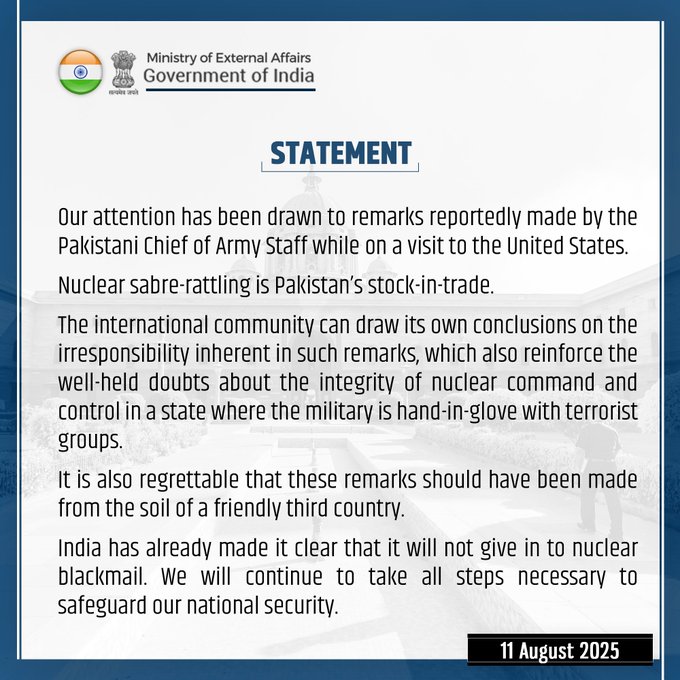In a strong and uncompromising response, India slams Pakistan Army Chief Asim Munir’s nuclear threat, calling his remarks “irresponsible” and a dangerous display of nuclear sabre-rattling. The Ministry of External Affairs (MEA) stated that such rhetoric exposes the Pakistani military’s deep connections with terrorist groups and raises fresh concerns about the safety of Pakistan’s nuclear arsenal.
Speaking to the media in New Delhi on August 11, the MEA emphasized that India will never bow to nuclear blackmail. “We will continue to take all steps necessary to safeguard our national security,” the official statement read, reaffirming Prime Minister Narendra Modi’s position on maintaining a firm defensive posture.

Background on Asim Munir’s Nuclear Annihilation Remark
The controversy began on August 10, when General Asim Munir delivered a provocative speech during a high-profile black-tie dinner in Tampa, Florida. Hosted by Pakistani businessman and honorary consul Adnan Asad, the event became a stage for Munir’s most aggressive rhetoric yet.
During his address, Munir threatened that Pakistan could “take half the world down” if pushed to an existential crisis with India. This was not just a vague warning — he explicitly mentioned launching military offensives from India’s east to west in the event of war.
Indus River Dispute and Dam Threats
Adding to the tension, Munir reignited disputes over the Indus Water Treaty, a decades-old agreement between India and Pakistan. He declared in Urdu:
“Hum wait karenge, jab dam banega, toh 10 missiles se faarigh kar denge”
(“We will wait until the dam is built, then destroy it with 10 missiles”).
This statement, targeting India’s potential future dams on the Indus River, raises fears of a water war in a region already facing severe resource challenges. Munir claimed that suspending the treaty could lead to mass starvation, affecting hundreds of millions.
India’s Firm Stand Against Nuclear Blackmail
In its rebuttal, India slams Pakistan Army Chief Asim Munir’s nuclear threat as an unacceptable provocation that undermines peace in South Asia. The MEA outlined three core points in its response:
- Zero tolerance for nuclear intimidation – India will respond decisively to any threat to its sovereignty.
- Exposing Pakistan’s terror links – The remarks prove the Pakistani military’s alignment with extremist elements.
- Strengthening global scrutiny – By framing the threat as a matter of international concern, India aims to increase diplomatic pressure on Pakistan.
Diplomatic Ripples in Washington
The timing and location of Munir’s remarks have also sparked debate in the United States. Delivering such hostile statements on American soil — shortly after meeting former US President Donald Trump and senior US Army officials — places Washington in a sensitive diplomatic position.
US policymakers are likely to face questions from both New Delhi and the international community about their stance on Pakistan’s aggressive posturing.
Global Security Implications
The escalation underscores the fragile balance in South Asia, where both India and Pakistan are nuclear powers with a long history of conflict. Public threats of this nature increase the risk of miscalculation, especially in times of political instability.
By taking a firm stand, India slams Pakistan Army Chief Asim Munir’s nuclear threat not just as a bilateral issue, but as a warning to the global community about the dangers of unchecked nuclear rhetoric.
As tensions rise, the world watches closely, knowing that in a region where history, politics, and military power collide, even words can edge nations closer to the brink.

